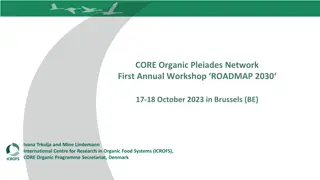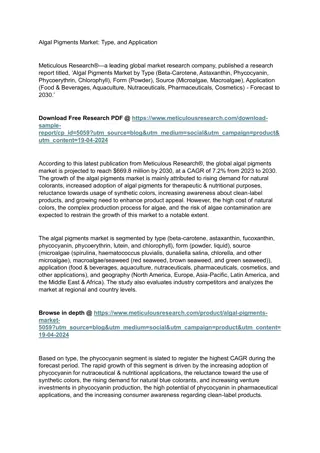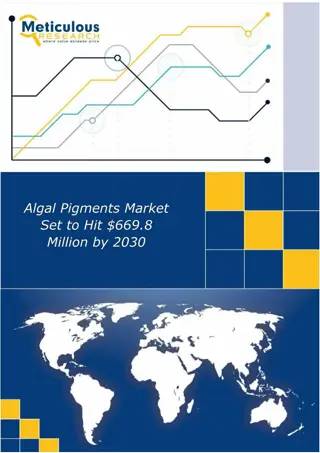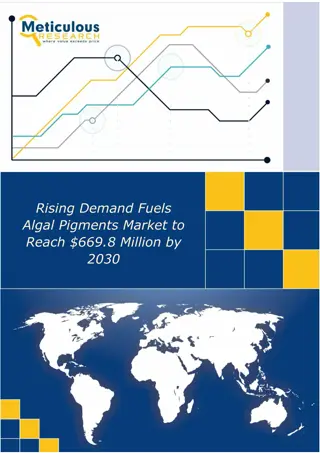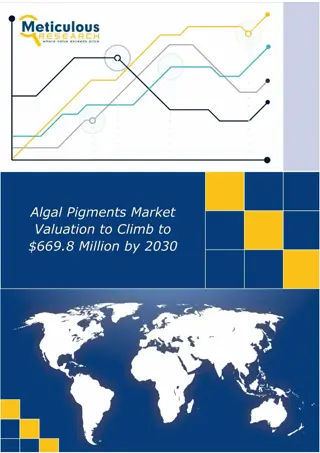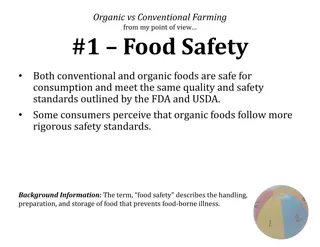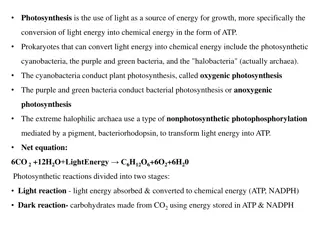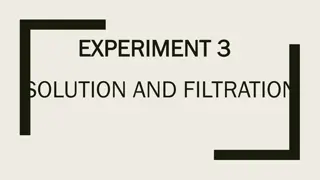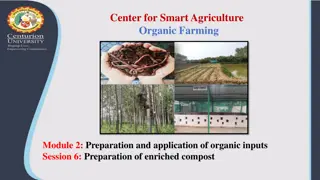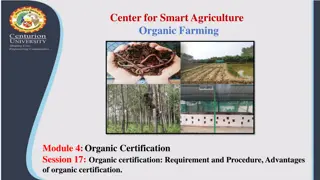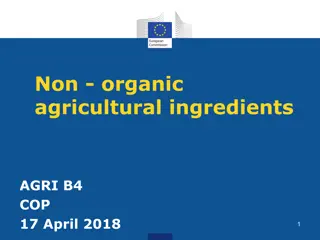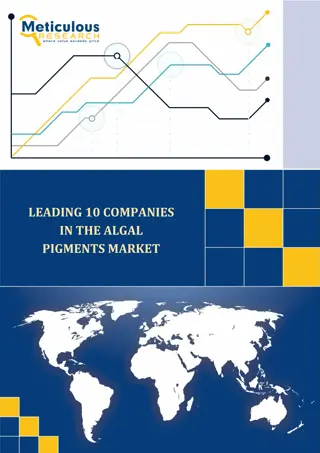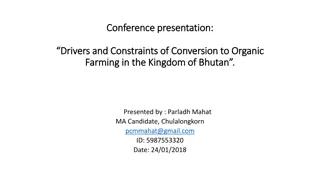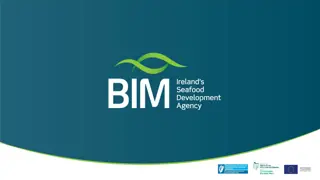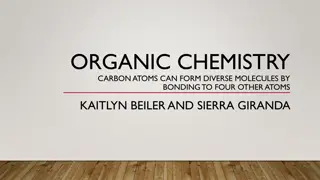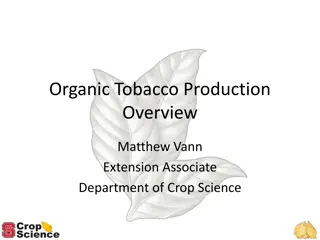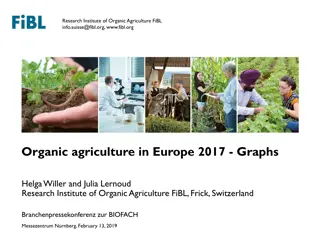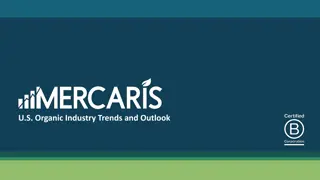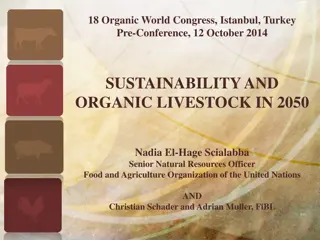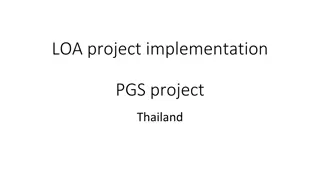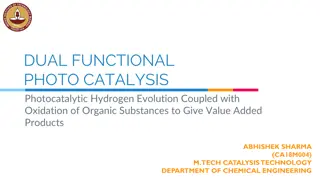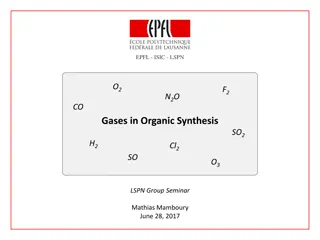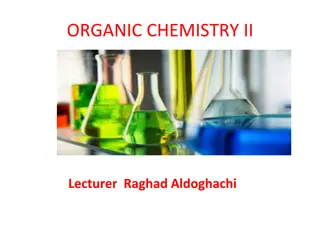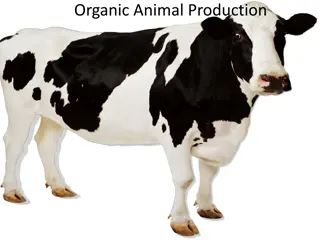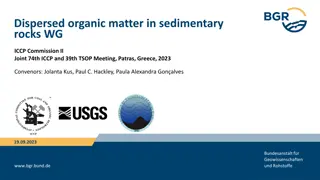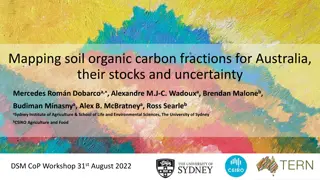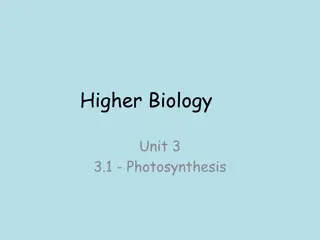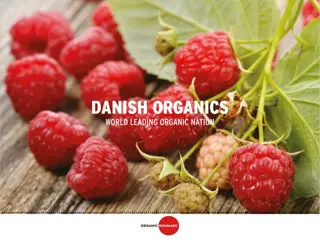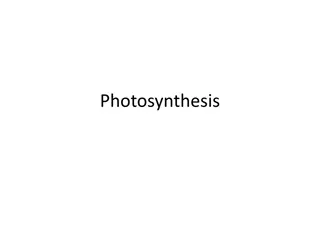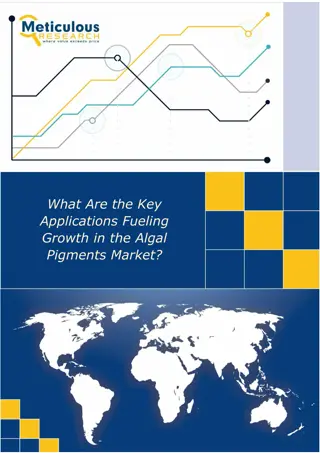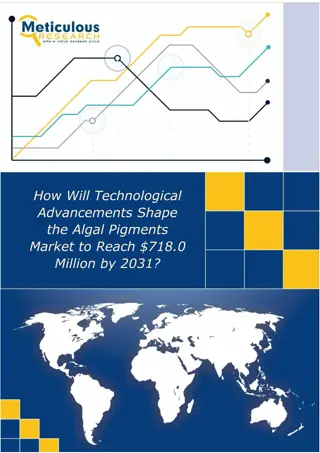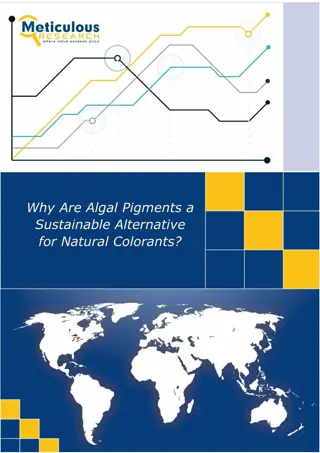CORE Organic Pleiades Network First Annual Workshop Roadmap 2030 - Event Recap
The CORE Organic Pleiades Network held its first annual workshop in Brussels, focusing on organic research and innovation in the European agri-food sector. The event discussed HEU partnerships, national/regional action plans, research funding, and more. CORE Organic aims to enhance knowledge and inn
0 views • 37 slides
Algal Pigments Market: Type, and Application
Meticulous Research\u00ae\u2014a leading global market research company, published a research report titled, \u2018Algal Pigments Market by Type (Beta-Carotene, Astaxanthin, Phycocyanin, Phycoerythrin, Chlorophyll), Form (Powder), Source (Microalgae, Macroalgae), Application (Food & Beverages, Aquac
8 views • 2 slides
Understanding the Diels-Alder Reaction in Practical Organic Chemistry
The Diels-Alder reaction is a fundamental method in organic chemistry for producing cyclic organic compounds by combining a conjugated diene with an alkene. This reaction, named after Otto Diels and Kurt Alder, involves the formation of a six-membered ring with specific bond rearrangements. Conjugat
4 views • 15 slides
Projections Show Algal Pigments Market Set to Surpass $669.8 Million by 2030
Dive into the dynamic realm of the algal pigments market with a comprehensive analysis of types, forms, sources, and applications. This forecast encapsulates a wide spectrum of algal pigments including Beta-Carotene, Astaxanthin, Phycocyanin, Phycoerythrin, and Chlorophyll, predominantly in powder f
0 views • 4 slides
Algal Pigments Market Set to Hit $669.8 Million by 2030
Dive into the dynamic realm of the algal pigments market with a comprehensive analysis of types, forms, sources, and applications. This forecast encapsulates a wide spectrum of algal pigments including Beta-Carotene, Astaxanthin, Phycocyanin, Phycoerythrin, and Chlorophyll, predominantly in powder f
0 views • 4 slides
Rising Demand Fuels Algal Pigments Market to Reach $669.8 Million by 2030
According to the most recent report by Meticulous Research\u00ae, the algal pigments market is projected to achieve $669.8 million by 2030.\n
0 views • 4 slides
Algal Pigments Market Valuation to Climb to $669.8 Million by 2030
As reported in the latest publication by Meticulous Research\u00ae, the algal pigments market is projected to reach $669.8 million by 2030, with a compound annual growth rate (CAGR) of 7.2% from 2023 to 2030.\n
0 views • 4 slides
Organic vs Conventional Farming: An Overview
In the debate between organic and conventional farming, both methods have their pros and cons. While organic foods are perceived to follow stricter safety standards, both types meet FDA and USDA regulations. They offer similar nutritional value, but organic farming tends to have lower efficiency due
0 views • 6 slides
Understanding Bacterial Photosynthesis: Types and Processes
Photosynthesis is the conversion of light energy into chemical energy, crucial for growth and production of ATP. Prokaryotes such as cyanobacteria, purple and green bacteria, and halobacteria demonstrate different forms of photosynthesis. Oxygenic photosynthesis, found in cyanobacteria, releases oxy
2 views • 20 slides
Separation and Purification of Organic Compounds: Methods and Techniques
The separation and purification of organic compounds are essential processes to obtain pure products, as impurities and side reactions can affect the quality of the compounds. Methods such as solution and filtration, crystallization, distillation, extraction, sublimation, and chromatography are comm
8 views • 15 slides
Enhancing Compost Quality for Organic Farming: Phosphorous-Enriched Compost Preparation
Composting is a natural process crucial for organic farming. Enriched compost improves nutrient supply to crops. Learn how to prepare phosphorous-enriched compost using organic wastes, bio-inoculants, and rock phosphate. Follow a method involving layering organic materials, cow dung, and rock phosph
3 views • 8 slides
Understanding Pathological Pigmentation: Causes and Effects
Pathological pigmentation involves the abnormal deposition of pigments in the body. It can be classified as exogenous or endogenous, with various sources and types of pigments. Melanin, one of the endogenous pigments, plays a crucial role in determining tissue color and can have protective functions
5 views • 23 slides
Understanding Organic Certification and NPOP in India
Organic certification is crucial for ensuring the quality and authenticity of organic products. This involves adhering to strict production standards and undergoing periodic inspections. In India, the National Programme on Organic Production (NPOP) plays a significant role in certifying organic comm
0 views • 10 slides
Concerns and Recommendations on Non-Organic Agricultural Ingredients
Various Member States express concerns about the inclusion of new non-organic agricultural ingredients in Regulation 889/2008 Annex IX, emphasizing the need to maintain the integrity of organic production. Suggestions include keeping the list as short as possible, searching for organic alternatives,
0 views • 19 slides
Algal Pigments Market
The Algal Pigments Market is on track for steady growth, anticipated to achieve a 4% CAGR between 2019 and 2025. With this growth rate, the market is projected to reach $452.4 million by 2025, highlighting the increasing adoption of algal pigments ac
1 views • 4 slides
Exploring Drivers and Constraints of Conversion to Organic Farming in Bhutan
Population in Bhutan heavily relies on agriculture, but the transition to organic farming has been slow despite the desire to reduce chemical use. This presentation investigates the current state of organic farming, identifies key factors affecting conversion, and offers policy recommendations to pr
0 views • 22 slides
organic chana masala
Nature\u2019s Spices Organic Chana Masala is a meticulously curated blend of organic spices, crafted to elevate the flavor of chickpea dishes. Sourced from certified organic farms, our masala blend is free from additives and artificial ingredients, e
1 views • 6 slides
Overview of Global Farmed Salmon and Organic Production
The data showcases the production figures for global farmed salmon across various countries, with Norway leading the production, followed by Chile, Scotland, and others. Additionally, insights into the growing organic salmon production, vulnerabilities in the sector, and details on organic mussels p
0 views • 9 slides
Understanding Organic Chemistry: Carbon Atoms and Molecular Diversity
In organic chemistry, carbon atoms can form diverse molecules by bonding to four other atoms, leading to molecular complexity and diversity. The versatile nature of carbon allows for the formation of various carbon skeletons, contributing to the vast array of organic compounds. Hydrocarbons, consist
0 views • 12 slides
Organic chicken masala
Organic Chicken Masala is a meticulously blended combination of premium organic spices, designed to elevate the taste and aroma of chicken dishes. Sourced from certified organic farms, our masala guarantees purity and is free from chemicals and pesti
1 views • 6 slides
Guide to Organic Tobacco Production Process
Understand the process of organic tobacco production including obtaining a contract, certifying land, inspections, maintaining certification, selling leaf, and transitioning from conventional to organic production. Get insights on organic certification through USDA-National Organic Program, required
0 views • 18 slides
Understanding Polymer Coatings and Paint Composition
Polymer coatings serve both decorative and functional purposes by changing surface properties like adhesion and resistance. The composition of paints involves solvents, pigments, additives, and resins to protect and beautify substrates. Different pigments like Titanium Dioxide and Zinc Oxide are use
0 views • 35 slides
Understanding Bonds and Electrons in Organic Compounds
Explore the world of organic chemistry by delving into the concepts of bonds, electrons, and their roles in determining properties of organic compounds. Discover why saturated fats are considered unhealthy, learn about bond energies, lengths, and orders, and unravel the mysteries of organic compound
0 views • 13 slides
Overview of Organic Agriculture in Europe 2017
Europe has seen a significant increase in organic farmland and retail sales in 2017. With 2.9% of Europe's farmland being organic, totaling 14.6 million hectares, countries like Spain, Italy, and France lead in organic farming. In terms of retail sales, Denmark and Switzerland stand out with high pe
0 views • 9 slides
Insights into U.S. Organic Industry Trends and Outlook
The U.S. organic industry is experiencing positive consumer demand growth, with organic food sales reaching $56 billion in 2020. Despite a decline in organic dairy sales, the overall organic acreage growth remains strong. The market faces challenges such as the impact of COVID-19, the need for produ
0 views • 12 slides
Sustainability and Organic Livestock Modeling for Global Food Security
The research presented at the 18th Organic World Congress in Istanbul delves into the Sustainability and Organic Livestock (SOL-m) modeling approach developed by FAO and FiBL. The study aims to explore the potential impacts of global conversion to organic livestock production by 2050 on food securit
0 views • 25 slides
Promoting Participatory Guarantee Systems (PGS) for Small Scale Organic Farming in Thailand
The project aims to strengthen organic agriculture communities in Thailand through the establishment of Participatory Guarantee Systems (PGS) as an alternative to third-party certification. PGS advocates for market and government recognition, focusing on quality assurance, trust, and knowledge excha
0 views • 13 slides
Dual-Functional Photo Catalysis: Hydrogen Evolution & Organic Oxidation
The research explores dual-functional photo catalysis, combining hydrogen evolution with the oxidation of organic substances to produce value-added products. It focuses on utilizing photoelectricity to create electrons for hydrogen production and organic molecule oxidation. The study investigates th
0 views • 14 slides
Role of Gases in Organic Synthesis: A Comprehensive Overview
The presentation delves into the significance of gases in organic synthesis at standard temperature and pressure, focusing on reactions with atom incorporation for the synthesis of useful organic molecules. It covers various gases such as H2, O2, O3, CO, NO, N2O, SO2, Cl2, F2, discussing their advan
0 views • 23 slides
Organic Chemistry II Lecturer Raghad Aldoghachi - Laboratory Safety Rules and Distillation Techniques
Explore the world of organic chemistry with Lecturer Raghad Aldoghachi through laboratory safety rules emphasizing following instructions, chemical safety, and appropriate attire. Learn about hazard symbols, organic compound studies, distillation as a separation method, purification of liquid organi
0 views • 17 slides
The History of Blue Pigments in Medieval Art
Explore the fascinating world of blue pigments used in medieval art, such as azurite, lapis lazuli, and ultramarine. Discover their origins, complexities, and significance in creating stunning masterpieces. From the cobalt mineral to the intricate process of making ultramarine, delve into the rich h
0 views • 10 slides
Organic Animal Production in the US: Insights and Statistics
Organic animal production in the US involves raising livestock and poultry through natural practices without antibiotics or hormones. Animals are fed organic feed and have access to outdoor spaces to mimic natural behavior. Statistically, over 5 million acres of land are certified for organic animal
0 views • 19 slides
Dispersed Organic Matter in Sedimentary Rocks - Review Paper for Geological Application Studies in the 21st Century
The WG on Dispersed Organic Matter in Sedimentary Rocks is working on a review paper focusing on application studies of dispersed organic matter (DOM) within a geological context. The paper aims to provide an insightful overview titled "Applications of Dispersed Organic Matter Petrology in the 21st
0 views • 18 slides
Mapping Soil Organic Carbon Fractions in Australia: Stocks and Uncertainty
This study by Mercedes Román Dobarco et al. focuses on mapping soil organic carbon fractions across Australia, including mineral-associated organic carbon, particulate organic carbon, and pyrogenic organic carbon. The research involves prediction of soil organic carbon fractions using spectral libr
0 views • 17 slides
Understanding Photosynthesis in Higher Biology
Photosynthesis is the process by which plants convert light energy into carbohydrates. This revision guide covers the photosynthesis word equation, stages, uses of products, and the role of light and pigments. It explains the absorption of light by leaves and the importance of chlorophyll and access
0 views • 14 slides
The Danish Model: Driving Organic Breakthrough & Market Growth
The Danish Model showcases the political and market mobilization behind the organic breakthrough in Denmark. Organic Denmark focuses on driving market growth through political policy, consumer motivation, innovation on farms, and strategic work with retailers and food services. The country has exper
0 views • 39 slides
Understanding Photosynthesis: Importance, Process, and Pigments
Explore the crucial process of photosynthesis in plants, from the absorption of sunlight to the production of biomolecules. Discover the significance of leaf pigments, light absorption, and why leaves are green. Delve into the types of pigments and the reasons behind leaves changing colors. Uncover
0 views • 22 slides
Algal Pigments Market
The algal pigments market had a valuation of $412.7 million in 2023 and is projected to expand to $718 million by 2031. It is estimated to achieve $442.1 million in 2024, experiencing a compound annual growth rate of 7.2% during the 2024-2031 period.
0 views • 4 slides
Algal Pigments Market
Starting at $412.7 million in 2023, the Algal Pigments market is projected to reach $718 million by 2031, with an estimated valuation of $442.1 million in 2024, marking a CAGR of 7.2% from 2024 to 2031.\n
0 views • 4 slides
Algal Pigments Market
With an initial valuation of $412.7 million in 2023, the Algal Pigments market is forecasted to grow to an estimated $442.1 million in 2024 and reach $718 million by 2031, driven by a CAGR of 7.2% over the period.\n
0 views • 4 slides
